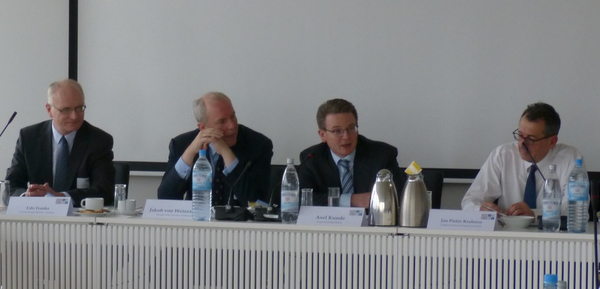On 1 February 2017, the SAFE Policy Center started a new event series in Brussels. The kick-off event covered the topic "Central Counterparties: The Tension between Competition and Financial Stability". The "SAFE Lunch Time Series" aims to foster debates among representatives from politics, regulation, academia and industry on topical issues. It will take place on an irregular basis at the Representation of the State of Hessen in Brussels.
Following the G-20 meeting in 2009, new regulations in Europe and the US made it mandatory to clear standardized over-the-counter (OTC) derivatives through central counterparties (CCPs). These new regulations largely increased the importance and systemic relevance of CCPs for financial markets. On the one hand, CCPs can foster financial stability by reducing contagion risk between financial market players. On the other hand, the reliance on CCPs may also create significant additional systemic risk.
Against this background, Udo Franke (German Ministry of Finance), Jakob von Weizsäcker (Member of the European Parliament) and Jan Pieter Krahnen (SAFE and Goethe University Frankfurt) discussed current developments. SAFE Director Krahnen outlined the topic and addressed the advantages and disadvantages of CCPs for the stability of financial markets. He highlighted the importance of competition and adequate supervision of CCPs (for more details of his position see SAFE White Paper No. 41).

Axel Kunde (Single Resolution Board) then moderated the subsequent panel discussion. Here, on the one hand, it was reminded that central counterparty clearing has brought considerable improvements to financial stability. It was also pointed out that the current regulation of CCPs was already quite strict and, thus, sufficient to keep the systemic risk raised by CCPs manageable. Hence, no pressing need was seen to change the current regulation framework of national supervision of CCPs.
On the other hand, it was emphasized that fiscal externalities of national decision making should play a more prominent role in the public discussion about CCPs. It would be favorable to revisit the discussion about a single European supervision authority to account for these negative side effects for other member countries, particularly in the presence of strong cross-border interdependencies within the EU.
Jan Pieter Krahnen highlighted the potential need for a public bailout guarantee for CCPs to assure financial stability even in the unlikely event of a price shock that exceeds the existing CCP safety buffer. According to Krahnen, this scenario should not be completely left out, considering potential runs on CCPs’ structures and the concentrated exposure of CCP members to particular asset classes.

